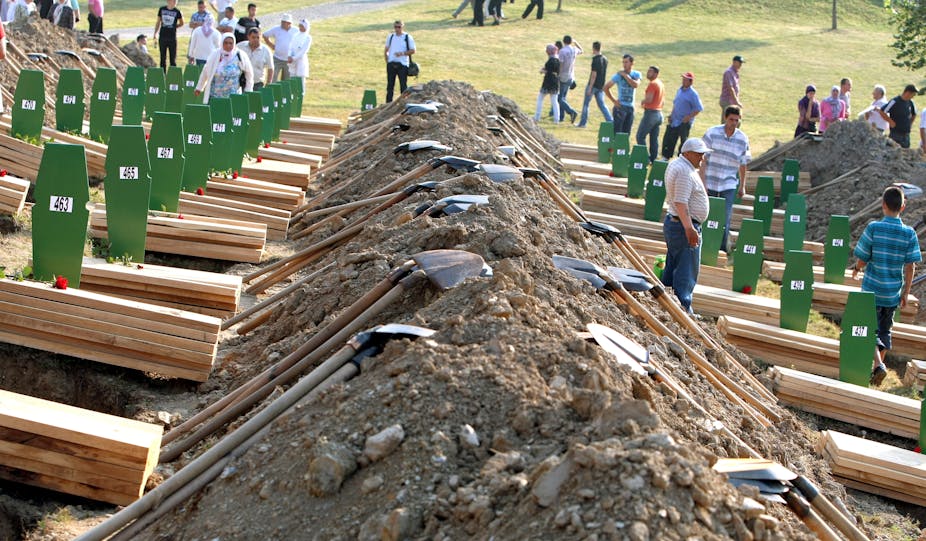In 1995 the Bosnian Serb army killed more than 8,000 Bosnian Muslims in what was known as the Srebrenica massacre. And after nearly 20 years and a ten-year legal battle, the International Criminal Tribunal for the former Yugoslavia (ICTY) has upheld its guilty verdicts against five of the men involved, confirming sentences of between 18 years and life for what has been judged to be a crime against humanity involving genocide.
Despite being declared a “safe area” by the United Nations and protected by around 450 Dutch UN peacekeepers, Srebrenica became the stage for a nine-day attack against mainly men and boys. As women were forced into buses and sent outside the enclave, men were left to face their death.
The memory of Srebrenica has been difficult to handle as Bosnia-Herzegovina tries to rebuild in the wake of its conflict. It has been particularly challenging for the different ethnic groups living in the country.
Not only does it emphasise the need for extensive efforts in truth-telling and fact finding, but also the need for a political commitment to acknowledging the atrocities committed during the war. It has equal implications for the role of justice and the legal system in the country.
The original trial
As part of the strategies for dealing with genocide and grave violations of human rights in the country, ICTY was established as a transitional justice mechanism to investigate and prosecute those responsible for atrocities such as the ones committed in 1995.
It issued its first judgement on the Srebrenica genocide in 2004. Radislav Krstic, deputy commander of the army of the Bosnian Serb forces, was charged with “aiding and abetting” genocide and given 35 years in prison.
Then in June 2010, five more men – Vujadin Popovic, Ljubisa Beara, Drago Nikolic, Vinko Pandurevic and Radivoje Miletic – were found guilty of genocide and crimes against humanity. Nikolic was sentenced to life imprisonment and Nikolic to 35 years. Pandurevic was sentenced to 13 years, Miletic to 19 years and and Gvero to five years. All five had played central roles in the military operation that led to the massacre.
The defendants all appealed their sentences, arguing that errors and misjudgements had been made in their indictments, and that the credibility of some of the witnesses against them was shaky. They also questioned evidence about the number of people killed in Srebrenica.
Firm stance
But now the court has upheld its ruling and reinforced its conclusion that Bosniaks, as Bosnian Muslims are also known, in Eastern Bosnia were victims of a strategy of genocide and ethnic cleansing planned and implemented by the Bosnian Serb forces during the war.

Due to the role of the ICTY in the transitional justice process of Bosnia and its impact on judicial institutions established in the country, the decision opens up questions around issues of truth, justice and reconciliation and their impact in the rebuilding of Bosnia-Herzegovina.
Back in 2012, the European Union condemned statements by Serbian president Tornislav Nikolic, who openly rejected the existence of a Serb genocide strategy during the war in Bosnia. The decision by the international court in these cases can be interpreted as a further blow to regular attempts by politicians in the region to deny that genocide took place.
It can also be seen as a push for rethinking transitional justice mechanisms in the country as it reopens debates at the local, national and international levels around the need for truth-telling mechanisms and discussions on justice and reconciliation between Bosnian Serbs and Bosniaks.
The decision is important in the ongoing process of post-war reconciliation between the different ethnic groups that live in the region. These groups are still divided and mistrustful of one another. This ruling is a reminder that dialogue about the past and future is needed at all levels. The different groups need to agree on what happened during the war and what type of justice should be pursued. Then there are issues such as missing people, mass graves and the return of refugee and internally displaced minorities to the country after the war.
The message from the court is that genocide took place and that those responsible will not get away with it. Now that message needs to be heard by politicians and people back home.

